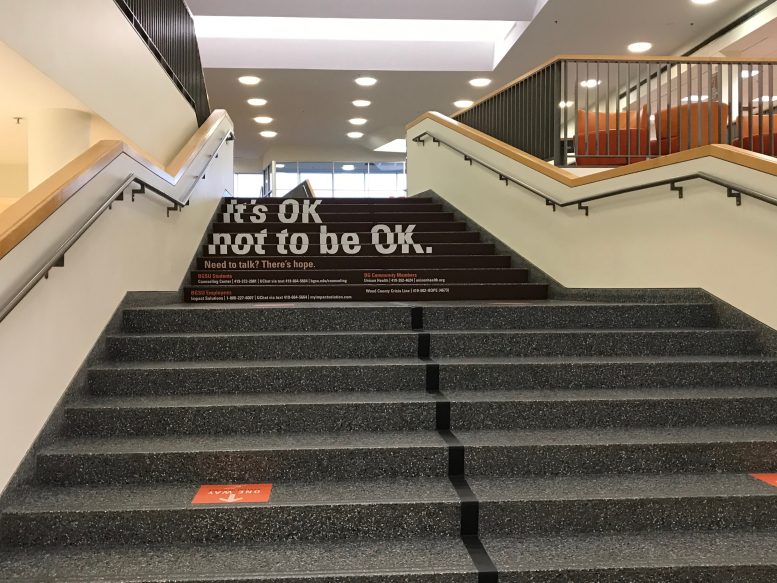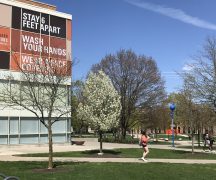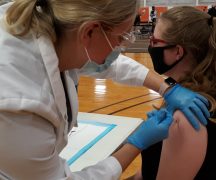By DAVID DUPONT
BG Independent News
Nicholas Juan-Xavier “Xavi” Boes needed that long six-week break from campus over the winter holidays.
The vice president of the Undergraduate Student Government at Bowling Green State University, said it wasn’t until the last week, that he started to feel relaxed.
Then the semester started up again.

The pandemic-plagued fall semester “took a toll on me,” he said in a telephone interview this week. He and other student leaders as well as many other students suffered “a mental beat down” during the COVID-19-riden semester. “People were worn down.”
Boes and several dozen other student leaders from campuses around the state made their point about the mental health impact of the pandemic to Ohio Chancellor of Higher Education Randy Gardner in three roundtables he hosted late last year.
Gov. Mike DeWine joined one of the sessions, though not the one Boes participated in.
In response, the state directed federal CARES Act dollars, as well as state money from GEER – Governor’s Emergency Education Relief fund – to help higher education meet the increased demand for mental health services.
The state’s 14 public universities received just over $8 million in funding. BGSU’s share was $565,470 ($209,433 in CARES dollars and $356,036 in GEER funds).
Gardner said that students expressed concern that the lack of social activity was feeding into their anxiety, and at the same time it was difficult to access counseling services. This affected not just mental health counseling but other kinds of counseling as well.

Having the governor involved helped move the issue along. Gardner said he’s always been impressed by the intensity with which DeWine listens to people. “The governor is the best listener of any elected state official I’ve worked with in the 35 years I’ve been in Columbus,” the former Wood County legislator said.
Gardner said DeWine listened to the students and then two days later asked him and the state director of mental health services to draw up plans. “Less than two weeks later there were checks being written,” Gardner said. “That’s a classic example of how he operates.”
BGSU President Rodney Rogers said he appreciated the extra help. While he didn’t have the metrics readily available, he knows there has been additional stress on students, as well as faculty and staff.
“We’re all, in different ways, challenged and looking out for each other. It’s all right to talk through issues that everybody has to get through,” he said.
When demand for services ebbed mid-semester, the university launched a marketing campaign to make sure students were aware of the services that are available.
Rogers said the money has been used to hir more personnel both for telehealth and for face-to-face appointments. The university is also hosting some outdoors social events for students.
Gardner said it is possible to use the funds to foster tighter connections with community mental health services.
The programming has a large impact on student mental health, Boes said. “Being able to interact and have experiences creates that home feeling that makes you want to take your education to the next level.”
The lack of such experiences certainly played a part in the decision of some students not to return to BGSU for the spring semester.
Rogers said that undergraduate enrollment has declined this semester, though the exact numbers won’t be known for a couple of weeks.
Boes believes some students didn’t want to pay for an education that didn’t include those opportunities. “The human interaction was something a lot of people crave” and yet they were not able to have in fall. “It was one thing after another. It just gets overwhelming and just brings you down.”
It was difficult. “It affected students heavily. … We had to relearn how to learn,” he said, because so much was done online. And they didn’t want to “go through that again.”
This is Boes’ last semester. The communications major is on track to graduate in May, and he’s ready “to attack” this final semester.
He’s also excited to see how student government addresses the multitude of problems posed by the pandemic.
Boes is planning to continue his studies with an eye toward going into higher education and student affairs. His experience during COVID-19 has only cemented his commitment to the field.
“It’s really made me more passionate,” he said of his plans. It’s all about “what we can do to navigate through these obstacles.”
That includes food insecurity – “you can’t learn if you’re hungry.”
Or student conduct violations. The concern is how to get that student back on track so they can be successful.
Gardner said this funding is not the beginning nor end of the state’s concern about student mental health.
It had already been designated as a priority in the 2019 budget.
This will be a learning experience, he said. “We’ll begin to learn what the campuses say worked and what was really helpful and build on that in the next state budget.”





